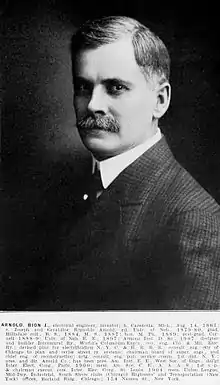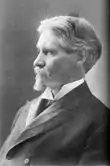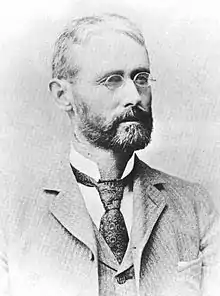Hillsdale College
Hillsdale College is a private conservative college in Hillsdale, Michigan. Founded in 1844 by abolitionists known as Free Will Baptists, it has a liberal arts curriculum that is based on the Western heritage as a product of both the Greco-Roman culture and the Judeo-Christian tradition.[4] Hillsdale requires every student, regardless of concentration of studies, to complete a core curriculum that includes courses on the Great Books, the U.S. Constitution, biology, chemistry, and physics.[5]
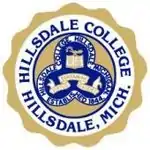 Hillsdale College Seal | |
Former names | Michigan Central College |
|---|---|
| Motto | Latin: Virtus Tentamine Gaudet |
Motto in English | Strength Rejoices in the Challenge |
| Type | Liberal arts college |
| Established | December 4, 1844 |
| Endowment | $528 million (2016)[1] |
| President | Larry P. Arnn |
| Provost | Christopher VanOrman |
Academic staff | 124 full-time, 48 adjunct[2] |
| Undergraduates | 1,486 |
| Location | , , United States 41.933°N 84.632°W |
| Campus | Rural, 400 acres (84 buildings)[3] |
| Colors | Blue and white |
| Athletics | NCAA Division II – GMAC |
| Nickname | Chargers |
| Website | hillsdale |
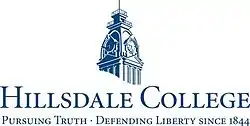 | |
Since the late 20th century, in order to opt out of federal affirmative action policies, Hillsdale has been among a small number of US colleges to decline governmental financial support, instead depending entirely on private funding to supplement students' tuition.[6][7][5]
History
Founding
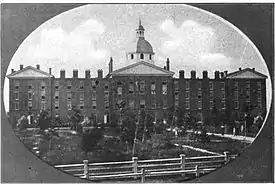
In August 1844, members of the local community of Free Will Baptists resolved to organize their denomination's first collegiate institution.[8]:4 After gathering donations, they established Michigan Central College in Spring Arbor, Michigan, on December 4, 1844.[8]:6 That site is now home to Spring Arbor University. Although religiously affiliated, the college was officially nonsectarian.[9]
Under its first president, Daniel McBride Graham, who held the office from 1844 to 1848, Michigan Central College opened within a two-room store and admitted five students. In March 1845, the government of Michigan incorporated the college, and the college enrolled 25 undergraduates by the end of its first year.[10]:12[11][8]:11
Edmund Burke Fairfield assumed the presidency of Michigan Central College in 1848. On March 20, 1850, the Michigan legislature granted the college a special charter, giving it the right to confer degrees.[10]:12–14[8]:116 Black students were admitted immediately after the college's founding,[12] and the college became the second school in the nation to grant four-year liberal arts degrees to women.[13][10]:12–14
Outgrowing its space, in 1853 the school moved to Hillsdale, Michigan, in part to have access to the railroad that served the city. It received considerable financial support from local citizens, who wanted to develop the 20-year-old town.[10]:30 The cornerstone of the new building, Central Hall, was laid on July 4, 1853.[14][8]:24 After Michigan Central College completed construction and moved, it reopened as Hillsdale College on November 7, 1855.
Fairfield led Hillsdale from 1848 to 1869.[11] During his presidency, he helped found the Republican Party with Ransom Dunn in neighboring Jackson, Michigan.[15] A prominent leader, Fairfield attended the first Republican Party convention in 1858, and was elected lieutenant governor of Michigan. Hillsdale's early anti-slavery reputation and pivotal role in founding the Republican Party led to the invitation of several notable speakers on the campus, including Frederick Douglass (who visited the school on two separate occasions) and Edward Everett, the orator preceding Abraham Lincoln at Gettysburg.[10]:xxv, 49 On August 8, 1860, Hillsdale conferred its first degrees. On March 20, 1863, the Michigan legislature formally legalized Hillsdale's change of name and location.[8]:33
Hillsdale no longer has any denominational affiliation but, according to its website, "the moral tenets of Christianity as commonly understood in the Christian tradition have been essential to the mission of the College".[16] Founded by abolitionists, it has always been open to black and female students.[5]
19th century
In 1861, many Hillsdale students joined the ranks of the Union Army during the American Civil War; a higher percentage of Hillsdale students enlisted than from any other Michigan college.[8]:60[17][18]:1 Hillsdale continued to operate during the war, but had limited enrollment because so many young men went to war. Half of Hillsdale's students who enlisted became officers, as was typical for men with some college education; five became lieutenant colonels, four received the Medal of Honor, and three became generals. Sixty students died in the war.[18]:5
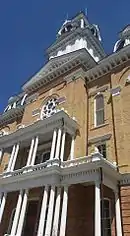
Hillsdale survived while nearly 80% of the colleges founded before the Civil War were forced to close. After the war, it regained its normal enrollment; many veterans returned and completed their education.[19] Hillsdale continued to host notable speakers, including the physician and educator Sophia Jex-Blake in October 1865.[8]:65 Hillsdale's Delta Tau Delta chapter, its first fraternity, was chartered on October 19, 1867.[8]:458
In 1869, James Calder succeeded Fairfield as president. Calder served through 1871. During his administration, the commercial school opened, a theological department was established, and the college enrolled around 750 students.[8]:73, 292, 411 He resigned to become president of Pennsylvania State University.[11]
In 1871 Clara Kern became the first woman awarded a degree at Hillsdale.[20] She became an author and education activist.[20]
Hillsdale's first president, Daniel McBride Graham, returned for a brief second term in 1871, notably rebuilding the campus after the catastrophic "Great Fire" of March 6, 1874.[10]:139–66[8]:77 DeWitt Clinton Durgin, a Union College alumnus, was president from 1874 to 1884.[11] In 1878, the Hillsdale Herald was published, becoming the 2nd oldest college newspaper in Michigan, behind Kalamazoo College's The Index. This paper later merged with another college paper to become The Collegian.[8]:page needed During Durgin's presidency, Hillsdale's Kappa Kappa Gamma and Sigma Chi chapters were chartered.[8]:462, 464
After Ransom Dunn's brief turn as acting president, George F. Mosher served as president of Hillsdale from 1886 to 1901.[11][21][22][8]:116, 125 During this time, the college grew in size and prestige. In 1884, Spencer O. Fisher became the first Hillsdale alumnus elected to Congress.[8]:119 Pi Beta Phi and Alpha Tau Omega were chartered.[8]:465, 467 In 1891, the Chicago Herald reported, "Hillsdale has a college second in standing to no denominational college in the country." Four years later, when the University of Chicago offered to affiliate with Hillsdale, the college rejected the proposal.[10]:page needed
20th century
In 1900, Hillsdale ceased grazing livestock and removed the agrarian fence circling the campus.[23]:xxiii[8]:135 It began an era of institutional growth and professionalization. In 1902, Joseph William Mauck became the college's sixth president, the first Hillsdale graduate to return as president of his alma mater.[11] Beloved by the college community and an early and outspoken advocate for women's suffrage, Mauck served for two decades.[24][25] One of the women's dormitories is named after Mauck.
Hillsdale adopted its first honor code and held its first homecoming celebration. In 1907, the college amended its Articles of Association, no longer requiring the president and trustees to be Free Will Baptists. This led to a decline in the theological department's prestige but an increase in the number of Christian denominations represented on campus.[8]:166[23]:xxiii In 1915, the college's chapter of the Delta Sigma Phi fraternity was chartered. When World War I broke out, a large proportion of (mostly male) students entered military service. By 1918 most of the upperclassmen had enlisted.
Four years after the war, William Gear Spencer succeeded Mauck as president. He served from 1922 to 1932, when he departed to lead Franklin College.[11][26] Under Spencer's leadership, the college prospered. During this time, Hillsdale acquired its 14-acre Slayton Arboretum, built new dormitories, constructed a new field house for its developing athletic programs, and, in 1924, chartered its chapter of Chi Omega.[23]:60–69
During the Great Depression, Willfred Otto Mauck, Joseph Mauck's son and also an alumnus, was selected as the eighth president, serving from 1933 to 1942.[11] Throughout this era, the college struggled financially, was forced to cancel its new construction projects, and cut the pay of its faculty and staff by nearly 20%.[23]:72–83[8]:210 Succeeding Mauck, Harvey L. Turner became Hillsdale's ninth president, serving from 1942 to 1952.[11] Despite its financial difficulties, the college built a new library, had an undefeated and untied football team in 1938, and celebrated its centennial in 1944, when more than 1,000 alumni returned to campus for the commencement ceremony.[23]:113[8]:267
J. Donald Phillips next assumed the presidency, holding the position from 1952 to 1971.[11] During his administration, Philips solved many of Hillsdale's financial worries and constructed many new campus buildings. In these years, Hillsdale began to resist federal regulations, particularly concerning affirmative action, which followed national civil rights legislation.[23]:167, 212[27][28] In 1962, the college's trustees adopted its own "Declaration of Independence". It affirmed Hillsdale's stance against governmental control.[23]:191 The college promoted the traditional education of the liberal arts and classics. In the late 20th century, it decided to forego any federal grants or subsidies, "to reaffirm its historic independence and to resist subsidization of its affairs by the federal government."[29]
George Roche III became the 11th president of Hillsdale College in 1971. During the Roche years, Hillsdale became nationally known, in part because of its withdrawal from federal and state-assisted loan programs and grants. The US Departments of Health, Education, and Welfare required the college to account for students by race as part of its affirmative action student loan program in the 1970s, but the administration publicly refused. Hillsdale's trustees said it would follow its own non-discrimination policy and that it would, "with the help of God, resist, by all legal means, any encroachments on its independence."[23]:237–39 In 1984, after a decade of litigation, the college withdrew from all federal student loans, replacing government assistance with private contributions.
Roche was highly successful in fundraising until he resigned due to allegations of a personal sexual scandal. During his presidency, the college dramatically increased its endowment, established the Center for Constructive Alternatives, and hosted prominent national speakers, including Ronald Reagan. It also began publishing Imprimis, a monthly speech digest.[11][23]:222–23 Russell Kirk taught at Hillsdale one semester a year throughout this time, beginning in 1973.
Roche resigned in late 1999, following his daughter-in-law Lissa Jackson Roche's suicide and her allegations of personal scandal.[6] On October 17, 1999, she said that she had engaged in a 19-year on-and-off sexual affair with him. She fatally shot herself at the Slayton Arboretum on campus with a .38-caliber handgun from her husband's gun cabinet.[30] Married to Roche's son, known as Roche IV, Jackson Roche was employed by Hillsdale as the Managing Editor of Imprimis and Hillsdale College Press.[31][30][32][33] President Roche denied the affair.[30][34] The college's reputation suffered and donations declined markedly.[6]
21st century
Larry P. Arnn has served as president of the college since 2000.[35] Under his tenure, the college completed various new buildings, including the John A. Halter Shooting Sports Center and Margot V. Biermann Athletic Center.[36] The college also opened the Allan P. Kirby, Jr. Center for Constitutional Studies and Citizenship, an off-campus educational center in Washington, D.C.[37]
In 2013, Arnn was criticized for remarks about ethnic minorities he made while testifying before the Michigan legislature against the Common Core curriculum standards. Expressing concern about government interference with educational institutions, he noted having received a letter from the state Department of Education early in his presidency that said his college "violated the standards for diversity." He added, "because we didn't have enough dark ones, I guess, is what they meant." After being criticized for calling minorities "dark ones," Arnn explained that he was referring to "dark faces". He stated: "The State of Michigan sent a group of people down to my campus, with clipboards ... to look at the colors of people's faces and write down what they saw. We don't keep records of that information. What were they looking for besides dark ones?"[38][39]
Michigan House Democratic Leader Tim Greimel condemned Arnn's comments, calling them "offensive", "inflammatory and bigoted", and asked for an apology.[40] In response, the college issued a statement apologizing for Arnn's remark, while reiterating his concern about "state-endorsed racism", as Arnn called affirmative action.[41]
Academics
Hillsdale enrolls approximately 350 new students each year, with a current enrollment of around 1,450 students from 47 states, the District of Columbia, and eight foreign countries. The college employs 124 full-time faculty members.[42] Hillsdale was ranked joint 76th-80th in the 2019 U.S. News & World Report listing of best National Liberal Arts Colleges.[43] The Princeton Review's The Best 384 Colleges 2019 ranked Hillsdale as 3rd for "most conservative students" and 9th for "professors get high marks".[44] Hillsdale was ranked 203rd overall, including 35th in the Midwest and 141st in private colleges, in the 2018 Forbes report of America's Top Colleges.[45]
Undergraduate offerings include a variety of liberal arts majors, pre-professional programs, a teacher education program, and a journalism certificate program.[46]
A graduate program called the "Graduate School of Statesmanship" was inaugurated in 2012. Its focus is political philosophy and American politics; it awards MA and PhD degrees in Politics.[47]
Campus
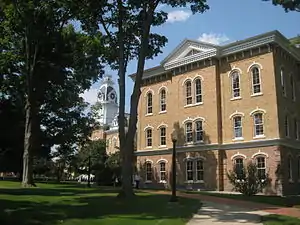
Hillsdale's 200-acre (81 ha) campus contains multiple instructional and office buildings, 13 residence halls, seven fraternity and sorority houses, an athletic complex, music hall, arts center, conference center, hotel, and preschool.[46] Hillsdale College also operates Hillsdale Academy, a private K–12 liberal arts school.[48]
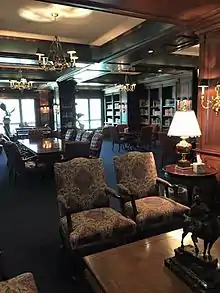
Hillsdale College was chosen to receive the personal library of Austrian School economist Ludwig von Mises, following the wishes contained in von Mises's will; the collection of works is housed in the Ludwig von Mises room of the college's Mossey Library. Mossey Library also contains collections of the works of Russell Kirk and Richard Weaver, and is home to the college's Richardson Heritage room. Built in 1994, the Heritage room holds many first-edition books and rare volumes, as well as sculptures, paintings, and historical artifacts.[49]
The college's Slayton Arboretum was officially created in 1922 when George A. Slayton and his wife donated 14 acres (5.7 ha) to the college. The arboretum was envisioned as an outdoor laboratory and field station for students and a biological garden for the community. Initial planting was with donated plants and the labor of Hillsdale students and volunteers. In 1939, Slayton Arboretum was listed as one of Michigan's Points of Interest, and up to 700 people a day visited the site.
The campus features the Liberty Walk, a walkway lined with bronze depictions of famous statesmen. These include George Washington, Thomas Jefferson, James Madison, Abraham Lincoln, Frederick Douglass, Winston Churchill, Margaret Thatcher, and Ronald Reagan. Reagan's statue was dedicated on October 7, 2011, the centennial year of his birth. Reagan spoke at the college in 1977, stating, "Hillsdale deserves the appreciation of all who labor for freedom."[50] On May 12, 2017, the college dedicated the Douglass statue, positioned directly opposite Lincoln's. Douglass was a guest at the college in 1863 (during the Civil War), where he gave an address titled "Popular Error and Unpopular Truth."[51] Madison's statue was dedicated on September 22, 2020.[52]
Policies
Hillsdale's charter prohibits any discrimination based on race, religion, or sex, and the college has been credited as the first American college to prohibit this type of discrimination in a charter.[12] Notably, Hillsdale's football team refused to play in the 1956 Tangerine Bowl in Florida when the governing committee of the bowl would not allow the team's black players to join the white players on the field; the committee then selected Juniata College instead.[12][53]
In the early 1980s, two hundred Hillsdale students lost their federal student loans due to the college's opposition to affirmative action. The U.S. federal government had asserted that it could require colleges where students received such funding to submit Assurance of Compliance forms mandated by Title IX and Hillsdale refused compliance, claiming that affirmative action was racial discrimination.[54][55] This ongoing dispute with the Department of Health, Education, and Welfare (HEW) intensified in 1979 when the college filed a petition for judicial review in the United States Court of Appeals for the Sixth Circuit, asking the court to overturn a previous decision by the Reviewing Authority, Office of Civil Rights of HEW. In December 1982, the Sixth Circuit upheld Hillsdale's refusal to sign the compliance forms but also ruled that government aid to individual students could be terminated without a finding that a college actually discriminated.[56]
In the related 1984 case, Grove City College v. Bell, the Supreme Court required every college or university to fulfill federal requirements—past and future requirements—if its students received federal aid. As a result of the court's decision, Hillsdale withdrew from all federal assistance beginning with the 1984–85 academic year; Grove City College, the defendant in that case, followed Hillsdale's lead four years later.[57] Beginning with the 2007–2008 academic year, Hillsdale stopped accepting Michigan state assistance, instead matching with its own aid any funds that a student would have received from the state.[58] Since 2007, Hillsdale's entire operating budget of the college, including scholarships, comes from private funding and endowments.
Programs
Center for Constructive Alternatives
Hillsdale brings speakers to campus through its Center for Constructive Alternatives program. Lectures are open to the public.[59] Speakers have included Stephen Ambrose, Benazir Bhutto, Harry Browne, Russell Kirk, Harvey Mansfield, Charles Murray, Ralph Nader, P.J. O'Rourke, Phyllis Schlafly, and Juan Williams.[60][61] Lectures and speeches from the series are published monthly in Imprimis,[62] and distributed monthly for free. First published in 1972, Imprimis has a circulation of over three million subscribers.[63]
Barney Charter School Initiative
The college's Barney Charter School Initiative was established to support the launch of K–12 charter schools based on a classical liberal arts model, with a strong civics component to "equip students to understand and defend the principles of the Declaration of Independence and the Constitution."[64]
Hillsdale-Oxford Scholars Program
Through an affiliation with Oxford's Center for Medieval and Renaissance Studies and the Oxford Study Abroad Program, Hillsdale College offers a study abroad program at Oxford University where participants participate in classes and extracurricular as associate members of one of 38 different colleges in the University.[65]
Allan P. Kirby Center
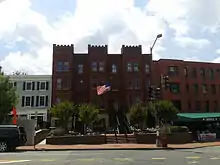
Hillsdale operates the Allan P. Kirby, Jr. Center for Constitutional Studies and Citizenship in Washington, D.C. The Kirby Center also provides assistance to Hillsdale students that are participating in Washington internships[66] and co-sponsors the James Madison Fellows Program with The Heritage Foundation and the Federalist Society. It engages with senior-level congressional staff members who the college describes as "dedicated to making first principles the foremost consideration in public policy formation".[67] A monthly lecture series hosted by the center is the AWC Family Foundation Lecture Series, which was started in 2008. The series has included lectures by David Horowitz, Brian Kennedy, John Bolton, and Hillsdale professor Paul A. Rahe.[68] The Kirby Center also hosts an annual Constitution Day celebration and conducts online, interactive town halls on matters related to the Constitution.
Campus life
Athletics
The college has a number of sports teams that compete at the NCAA Division II level, including baseball, men's and women's basketball, football, softball, women's swimming, track and field, cross country, men's and women's tennis, and women's volleyball.[69] The college also has club teams and intramural sports that vary from year to year.[70] The Chargers, as the Hillsdale athletics teams are known, compete in the Great Midwest Athletic Conference.
Football coach Frank "Muddy" Waters was the head coach at Hillsdale from 1954–1973. The football stadium, Frank Waters Stadium, is named in his honor.[71]
In 2018, Hillsdale College was named one of the best schools in the U.S. for student-athletes by Next College Student Athlete's 2018 NCSA Power Rankings.[72] Hillsdale was the fourth ranked school among all NCAA Division II colleges and universities in the U.S.[73] The NCSA Power Rankings, which recognize the best colleges and universities in the U.S. for student-athletes, ranked Hillsdale within the top 10 among all Division II schools for several sports including football, baseball, softball, men's and women's basketball, men's and women's tennis, men's and women's track and field, women's swimming and women's volleyball. Hillsdale men's track and field also ranked 97th overall (among all divisions).[74]
Hillsdale also has a nationally ranked competitive shotgun team.[75] Competing in both the Association of College Unions International and the Scholastic Clay Target Program circuits, the team is a six-time ACUI Collegiate national champion, winning in 2012 and 2014–2018. It competes in six shotgun shooting disciplines: trap, skeet, sporting clays, and a variation on each.
Greek life
North American Interfraternity Conference Fraternities
- Delta Tau Delta – Kappa Chapter, rechartered in 2007[76]
- Sigma Chi – Alpha Kappa Chapter, rechartered in 1980[10]:188
- Alpha Tau Omega – Beta Kappa Chapter, 1888[77]
- Delta Sigma Phi – Tau Chapter, 1915[78]
National Panhellenic Conference Sororities
- Kappa Kappa Gamma – Kappa Chapter, 1881[79]
- Pi Beta Phi – Michigan Alpha Chapter, 1887[80]
- Chi Omega – Rho Gamma Chapter, 1924[81]
Alma mater
Hillsdale's alma mater is "White and Blue". The words and melody were composed by Bess Hagaman Tefft, Class of 1937.[82]
Notable people
Notable alumni

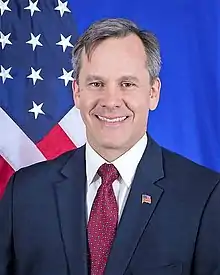
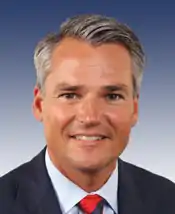
Politics and law
- E. Ross Adair (1929), member of the U.S. House of Representatives from Indiana
- Chester Hardy Aldrich (1888), Governor of Nebraska and justice on the Nebraska Supreme Court[83]
- Joseph Cella (1991), United States Ambassador to Fiji[84]
- Chris Chocola (1984), member of the U.S. House of Representatives from Indiana's 2nd congressional district and President of the Club for Growth[85]
- Cyrus Cline (1876), member of the U.S. House of Representatives from Indiana
- David L. Cornwell (1964), member of the U.S. House of Representatives from Indiana
- Dan Crane (1958), member of the U.S. House of Representatives from Illinois' 22nd and 19th congressional districts
- Phil Crane (1952), member of the U.S. House of Representatives from Illinois' 8th congressional district
- Robert William Davis (1952), member of the U.S. House of Representatives from Michigan's 11th congressional district
- Solomon Robert Dresser (1865), member of the U.S. House of Representatives from Pennsylvania and founder and president of S.R. Dresser Manufacturing Co., now Dresser Industries[86]
- Spencer O. Fisher (c. 1865), member of the U.S. House of Representatives from Michigan's 10th congressional district
- Albert J. Hopkins (1870), U.S. Senator from Illinois
- Henry M. Kimball (c. 1900), member of the U.S. House of Representatives from Michigan's 3rd congressional district
- Verner Main (1907), member of the U.S. House of Representatives from Michigan
- Spencer G. Millard (1877), Lieutenant Governor of California
- Joseph B. Moore (1879), justice on the Michigan Supreme Court
- Thomas Morrison (1997), representative for the 54th District in the Illinois General Assembly[87]
- Aric Nesbitt (2001), member of Michigan House of Representatives (2011–2017), 66th district and House Majority Floor Leader;[88] President Pro Tempore of the Michigan State Senate (2019–present)
- Walter H. North (1896), justice on the Michigan Supreme Court[89]
- Jasper Packard (c. 1853), newspaper editor and U.S. Representative from Indiana[90]
- Paul J. Ray, Administrator of the Office of Information and Regulatory Affairs
- David Viviano (1994), justice on the Michigan Supreme Court[91]
- Beth Walker (1987), justice of the West Virginia Supreme Court of Appeals
- Hans Zeiger (2007), author and representative for the 25th Legislative District of Washington[92]
Military and public service
- Clinton B. Fisk (c. 1844), Civil War soldier and statesman, namesake of Fisk University and Prohibition Party candidate for president in 1888; first inductee into the Hillsdale County, Michigan Veteran's Hall of Fame in 2001[93]
- Mary Hannah Fulton (1874), medical missionary in China
- Washington Gardner (1870), Civil War soldier and statesman[94]
- Moses A. Luce (1866), lawyer and Medal of Honor recipient for service in the Civil War[95]
- Erik Prince (1992), Navy SEAL and founder of Blackwater
Science and engineering
- Bion J. Arnold, pioneer in electrical engineering and mass transportation
Professional sports and athletics
- Andre Holmes (2011), wide receiver for the Denver Broncos[96]
- Jared Veldheer (2010), offensive lineman for the Green Bay Packers[97]
- Tom Heckert (1990), former general manager for the Cleveland Browns[98]
- Spanky McFarland (1976), college baseball coach at Northern Illinois and James Madison
- Ron Tripp (c. 1975), expert in sambo and judo and current general secretary of USA Judo
- Chester Marcol (1972), placekicker for the Green Bay Packers and Houston Oilers
- Chuck Liebrock (1967), offensive lineman in the Canadian Football League for the Toronto Argonauts and Winnipeg Blue Bombers
- Bruce McLenna (1966), halfback for the Detroit Lions and Kansas City Chiefs
- Bud Acton (c. 1964), NBA player with the San Diego Rockets
- Howard Mudd (1963), offensive lineman for the San Francisco 49ers and Chicago Bears and offensive line coach for the Philadelphia Eagles
- Wayne Schurr (1959), relief pitcher for the Chicago Cubs
- Mike Lude (1948), head football coach at Colorado State University and Athletic Director at Kent State University, University of Washington, and Auburn University
- Fred Knorr (1937), radio executive and part-owner of the Detroit Tigers[99][100]
- Lynn Bell (1906), minor-league professional baseball player and college football coach
Academia and scholarship
- Manuel Ayau (1973), Guatemalan-born politician, humanitarian, and founder of the "Universidad Francisco Marroquín"[101]
- Elizebeth Friedman (1910), pioneer in cryptology
- Peter Leeson (2001), economist[102]
- Robert P. Murphy (1998), economist and author[103]
- Gennady Stolyarov II (2008), libertarian and transhumanist writer
- Robert Page Sims (1897), college president, civil rights activist
Present faculty
- Michael Anton, former senior national security official in the Trump administration[104]
- Larry P. Arnn, educator and political scientist[105]
- Michael Bauman, theologian[106]
- Bradley J. Birzer, History professor and the Russell Amos Kirk Chair in American Studies.[107]
- Ronald J. Pestritto, Graduate Dean and Professor of Politics.[108]
- Paul A. Rahe, historian
- Gary L. Wolfram, economist and public policy analyst[109]
- D. G. Hart, historian
- Mollie Hemingway, journalist[110]
- David Azerrad, former director and fellow at the Heritage Foundation[111]
Visiting faculty and fellows
- Victor Davis Hanson, classicist and war historian[112]
- D.G. Hart, religious and social historian
- Mark Helprin, novelist and intelligence expert[113]
- Carl F.H. Henry, theologian[112]
- David McCullough, historian[112]
- Madsen Pirie, British researcher, author, and educator[112]
- Mark Steyn, journalist[112]
- Clarence Thomas, Associate Justice of the Supreme Court of the United States[112]
Past faculty
- John Jay Butler, Free Will Baptist theologian
- Allan C. Carlson, historian[114]
- Ransom Dunn, dean and professor emeritus
- Clark Durant, educator, Senate candidate, co-founder of Cornerstone Schools (Michigan) and Imprimis
- Richard Ebeling, Austrian School economist[115]
- Burton Folsom, economic historian[116]
- Sir Martin Gilbert, official biographer of Winston Churchill and twentieth-century historian[112]
- Daniel McBride Graham, abolitionist, inventor
- Russell Kirk, conservative writer
- Madsen Pirie, British researcher and former visitor in philosophy and logic
- Frank "Muddy" Waters, College Football Hall of Fame inductee[117]
Notable Administrators and Promoters
- Pat Sajak, Wheel of Fortune host, President of the Hillsdale College Board of Trustees[118]
- Rush Limbaugh, political commentator, media personality
- Hugh Hewitt, political commentator
- Mark Levin, radio personality
References
- Noble, Breana (September 14, 2017). "College passes fundraising goal". Retrieved October 4, 2017.
- "College profile". Hillsdale College website. Hillsdale College. Retrieved September 2, 2015.
- "College Profile". Hillsdale College website. Hillsdale College. Retrieved September 2, 2015.
- "Mission". Hillsdale College. March 2, 2016.
- Eckholm, Erik (February 1, 2017). "In Hillsdale College, a 'Shining City on a Hill' for Conservatives". New York Times. Retrieved July 9, 2018.
- Alice Lloyd, "The College That Wants to Take Over Washington", Politico, 12 May 2018; accessed 4 August 2018
- Anderson, Nick; Douglas-Gabriel, Danielle (December 15, 2017). "Hillsdale College, subject of Senate debate, is known for rejecting federal funds". Washington Post. ISSN 0190-8286. Retrieved May 14, 2018.
- Moore, Vivian Elsie Lyon (1944). The First Hundred Years of Hillsdale College. Ann Arbor, Mich.: The Ann Arbor Press. OCLC 4819396. 588 pp.
- Vedder, Henry Clay (1897). A Short History of the Baptists. American Baptist Publication Society. p. 273. Retrieved December 23, 2010.
- Gilbert, Arlan K. (1991). Historic Hillsdale College: Pioneer in Higher Education, 1844–1900. Hillsdale, Mich.: Hillsdale College Press. p. 274. ISBN 978-0916308797. OCLC 24636032.
- "Hillsdale College: Past Presidents". Retrieved December 23, 2010.
- Hoplin, Nicole; Robinson, Ron (2008). Funding Fathers: The Unsung Heroes of the Conservative Movement. ISBN 978-1596985629. Retrieved August 27, 2014 – via Google Books.
- Irene Harwarth; Mindi Maline; Elizabeth DeBra. "Women's Colleges in the United States: History, Issues, and Challenges". United States Department of Education, National Institute on Postsecondary Education, Libraries, and Lifelong Learning. Archived from the original on June 14, 2010. Retrieved December 23, 2010.
- "Archived copy". Archived from the original on November 17, 2014. Retrieved 2014-09-18.CS1 maint: archived copy as title (link)
- "Dr. E.B. Fairfield Dead" (PDF). New York Times. November 19, 1904.
- Guidelines Regarding the Mission and Moral Commitments of Hillsdale College July 2010
- Dan Bisher (1999). "A Brief History of Hillsdale County, Pioneer Period: 1825–1843".
- Gilbert, Arlan K. (1994). Hillsdale Honor: The Civil War Experience. Hillsdale, Mich.: Hillsdale College Press. ISBN 978-0916308728. OCLC 29816536. 88 pp.
- Gilbert, Arlan K. (1991). Historic Hillsdale College: Pioneer in Higher Education, 1844-1900. Hillsdale College Press. ISBN 9780916308797.
- Hallwas, John (March 17, 2012). "Educational reformer and children's author Clara Bayliss". The McDonough County Voice. Archived from the original on June 1, 2019. Retrieved June 1, 2019.
- "George Frank Mosher; Former Consul at Nice, Educator and Bay State Legislator Dies". New York Times. November 19, 1904. Retrieved December 23, 2010.
- "Lives of the Founders and Builders of Hillsdale College". google.com. 1885. Retrieved March 10, 2015.
- Gilbert, Arlan K. (1998). The Permanent Things: Hillsdale College 1900–1994. Hillsdale, Mich.: Hillsdale College Press. ISBN 978-0916308629. OCLC 39113606. 320 pp.
- "Leading Men Take Up the Question of Women's Right to Vote" (PDF). New York Times. December 20, 1908. Retrieved December 23, 2010.
- "George Dr. Joseph Mauck, educator, Was 84". New York Times. July 8, 1937. Retrieved December 23, 2010.
- "Spencer Heads Franklin College". New York Times. March 31, 1933. Retrieved December 23, 2010.
- "Hillsdale College Athletics". hillsdalechargers.com. Retrieved April 13, 2015.
- "College History/Past Presidents – Hillsdale College". hillsdale.edu. Retrieved April 13, 2015.
- Freedom and Independence: The Hillsdale Story, 35
- Miller, John (November 12, 1999). "Horror at Hillsdale". NationalReview.
- Jones, E. Michael. "Death at the Gazebo: Conservatism In Extremis at Hillsdale College". Culture Wars (January 2000).
- Ellis, Jonathan (January 19, 2000). "Sex, lies and suicide". Salon.
- Rapoport, Roger (2000). Hillsdale: Greek Tragedy in America's Heartland. RDR Books. ISBN 978-1571430885.
- Meredith, Robyn (November 15, 1999). "Scandal Rocks a Conservative Campus". New York Times.
- "National News Briefs; Conservative College Names New President". New York Times. April 7, 2000. Retrieved February 26, 2011.
- "Campus Facilities – Hillsdale College". hillsdale.edu. Retrieved April 13, 2015.
- "About Us – Kirby Center". hillsdale.edu. Archived from the original on March 16, 2015. Retrieved April 13, 2015.
- Klein, Rebecca (August 1, 2013). "Hillsdale College President Larry Arnn Under Fire For Calling Minority Students 'Dark Ones'". Huffington Post.
- "Mich. college president calls minorities 'dark ones'". USA Today. Retrieved December 4, 2017.
- "Statement from House Democratic Leader Tim Greimel (D-Auburn Hills) on Hillsdale College President Larry Arnn's racist remarks: | Michigan House Democratic Caucus". Housedems.com. July 31, 2013. Archived from the original on January 7, 2014. Retrieved August 27, 2014.
- Higgins, Lori; Jesse, David (August 1, 2013). "Hillsdale president get heat over racial remark". Detroit Free Press. Retrieved September 26, 2013.
No offense was intended by the use of that term except to the offending bureaucrats, and Dr. Arnn is sorry if such offense was honestly taken. But the greater concern, he believes, is the state-endorsed racism the story illustrates.
- "About – College Profile – Hillsdale College". Hillsdale.edu. Retrieved August 27, 2014.
- "Hillsdale College". U.S. News & World Report Best Colleges. 2019. Retrieved November 29, 2018.
- "The Best 384 Colleges: Most Conservative Students". Retrieved November 29, 2018.(registration required)
- "Forbes, America's Top Colleges, #203 Hillsdale College". 2018. Retrieved November 29, 2018.
- "Hillsdale College: About Hillsdale". Retrieved April 15, 2011.
- "Graduate School". Hillsdale College. June 23, 2014. Retrieved August 27, 2014.
- "Hillsdale Academy". Retrieved December 23, 2010.
- "About – Collections – Mossey Library". lib.hillsdale.edu. Retrieved July 26, 2016.
- Archived September 26, 2009, at the Wayback Machine
- @AndrewKingHDN, Andrew King aking@hillsdale.net Twitter. "College unveils statue of Frederick Douglass". Retrieved October 4, 2017.
- http://hillsdalecollegian.com/2020/09/college-holds-dedication-for-james-madison-statue/
- McGurn, William (June 2, 2009). "How Hillsdale Beats Harvard". The Wall Street Journal. Retrieved December 23, 2010.
- Appeals, United States Court of; Circuit, Sixth (December 7, 1981). "696 F2d 418 Hillsdale College v. Department of Health Education and Welfare". OpenJurist.org. F2d (696): 418. Retrieved August 9, 2016.
- Glenn M. Wong (2010). Essentials of Sports Law. p. 340. ISBN 978-0313356759. Retrieved August 9, 2016.
- "Grove City College, et al. v. Terrel H. Bell, Secretary of Education, et al.: No. 82-792 : In the Supreme Court of the United States; October Term, 1983" (TXT). Justice.gov. Retrieved August 9, 2016.
- The Controversial Reason Some Religious Colleges Forgo Federal Funding, The Atlantic, Ibby Caputo Marcus, July 7, 2016. Retrieved April 1, 2020.
- "Hillsdale rejects Michigan grants". The Detroit News. August 14, 2007.
- "Center for Constructive Alternatives – Hillsdale College". Hillsdale.edu. June 23, 2014. Retrieved August 27, 2014.
- "Hillsdale College: Center for Constructive Alternatives". Retrieved December 23, 2010.
- "Hillsdale College: Audio and Video Tapes (CCA)" (PDF). Archived from the original (PDF) on June 10, 2011. Retrieved December 23, 2010.
- ISSN 0277-8432: OCLC 3890282, 19295004 (print); OCLC 800049146 (on-line)
- "Imprimis". Hillsdale.edu. Retrieved January 12, 2018.
- "Outreach/Charter Schools – Hillsdale College". Hillsdale.edu. June 23, 2014. Retrieved August 27, 2014.
- "Oxford – Hillsdale College". Hillsdale.edu. March 4, 2016. Retrieved August 9, 2016.
- "Hillsdale College". ctcl.org. Retrieved March 10, 2015.
- "James Madison Fellowship Program". Allen P. Kirby Center, Hillsdale College. Archived from the original on October 4, 2013. Retrieved October 1, 2013.
- "Lecture Series". hillsdale.edu. Archived from the original on October 30, 2014. Retrieved March 10, 2015.
- "Hillsdale College Athletics: Official Homes of the Chargers". Retrieved December 23, 2010.
- "About Hillsdale College: Frequently Asked Questions". Retrieved December 23, 2010.
- "Hillsdale College Athletics: Facilities". Retrieved December 23, 2010.
- "Top US Athletic And Academic Universities". Retrieved February 15, 2019.
- "Best NCAA Division 2 Colleges". Retrieved February 15, 2019.
- "Best Men's Track and Field Colleges". Retrieved February 15, 2019.
- "Hillsdale College Athletics". hillsdalechargers.com. Retrieved December 4, 2020.
- "Delta Tau Delta, Undergraduate Chapters: Michigan". Archived from the original on July 23, 2011. Retrieved December 23, 2010.
- "Alpha Tau Omega, Chapters By State". Retrieved December 23, 2010.
- "Delta Sigma Phi, Ohio Valley Locations". Archived from the original on June 11, 2010. Retrieved December 23, 2010.
- "Kappa Kappa Gamma at Hillsdale College". Archived from the original on July 26, 2011. Retrieved December 23, 2010.
- "The Pi Beta Phi Chapter at Hillsdale College". Retrieved December 23, 2010.
- "Chi Omega, Collegiate Chapters". Archived from the original on October 20, 2010. Retrieved December 23, 2010.
- "College History/Alma Mater – Hillsdale College". Hillsdale.edu. June 23, 2014. Retrieved August 27, 2014.
- "Nebraska Governor Chester Hardy Aldrich". National Governors Association. Retrieved September 16, 2012.
- "Ambassador Joseph J. Cella". U.S. Embassy in Fiji, Kiribati, Nauru, Tonga, and Tuvalu. Retrieved April 26, 2020.
- "Why the Club for Growth Is Changing Leadership". www.nationaljournal.com. Retrieved June 9, 2015.
- "Dresser, Solomon Robert – Biographical Information". congress.gov. Retrieved June 9, 2015.
- "Illinois State Representative Thomas Morrison". repmorrison54.com. Retrieved June 9, 2015.
- "Aric Nesbitt, District 66". Michigan House Republicans. February 5, 2015. Retrieved June 9, 2015.
- "The Honorable Walter Harper North". University of Michigan Law School. Retrieved April 13, 2011.
- Commission, Michigan Historical (1907). Michigan Historical Collections. Volume 6.
- "David Viviano". ballotpedia.org. Retrieved June 9, 2015.
- "Hans Zeiger". Washington State House Republicans. Retrieved June 9, 2015.
- College), Amphictyon Society (Hillsdale (1890). "History of the Amphictyon Society of Hillsdale College, Hillsdale, Michigan". google.com.
- "Gardner, Washington – Biographical Information". congress.gov.
- "Pvt Moses Augustine Luce". aotw.org.
- "Andre Holmes". NFL.com. Retrieved June 9, 2015.
- "Jared Veldheer". NFL.com. Retrieved June 9, 2015.
- Nate Ulrich. "Game day for Browns GM Tom Heckert". www.ohio.com. Retrieved June 9, 2015.
- "Radio station owner brought British Invasion to Metro airwaves" (PDF). Detroitmemories.com. Retrieved August 9, 2016.
- "Brief Biography". ufm.edu. Archived from the original on June 19, 2015. Retrieved June 9, 2015.
- "Peter T. Leeson". Cato Unbound. Retrieved June 9, 2015.
- "Robert P. Murphy". DeSmogBlog. Retrieved June 9, 2015.
- "The End of Conservatism and the Rebirth of Politics". Retrieved November 29, 2018.
- "Archived copy". Archived from the original on May 22, 2013. Retrieved 2013-06-05.CS1 maint: archived copy as title (link)
- "Archived copy". Archived from the original on May 28, 2010. Retrieved 2010-02-02.CS1 maint: archived copy as title (link)
- "Brad Birzer". Hillsdale College. Retrieved July 20, 2018.
- "Ronald J. Pestritto". Hillsdale College. Retrieved February 18, 2018.
- "Dr. Gary L. Wolfram". mackinac.org. Retrieved March 10, 2015.
- https://www.washingtonexaminer.com/opinion/how-hillsdale-college-helps-journalism-by-hiring-mollie-hemingway. Missing or empty
|title=(help) - https://www.globenewswire.com/news-release/2019/10/30/1938163/0/en/Hillsdale-College-Welcomes-David-Azerrad-to-Washington-D-C-Campus.html. Missing or empty
|title=(help) - "Academics/Programs/Visiting Fellows – Hillsdale College". hillsdale.edu. Retrieved March 10, 2015.
- "Archived copy". Archived from the original on May 28, 2010. Retrieved 2010-04-29.CS1 maint: archived copy as title (link)
- "Archived copy". Archived from the original on May 28, 2010. Retrieved 2010-02-02.CS1 maint: archived copy as title (link)
- "Archived copy". Archived from the original on June 12, 2010. Retrieved 2010-04-29.CS1 maint: archived copy as title (link)
- "Archived copy". Archived from the original on October 15, 2009. Retrieved 2010-02-02.CS1 maint: archived copy as title (link)
- "College Football Hall of Fame || Famer Search". Archived from the original on July 24, 2012.
- https://www.wsj.com/articles/the-conservative-wheelman-1443218583. Missing or empty
|title=(help)
External links
| Wikimedia Commons has media related to Hillsdale College. |
- Official website
- The Hillsdale Collegian, the campus newspaper
